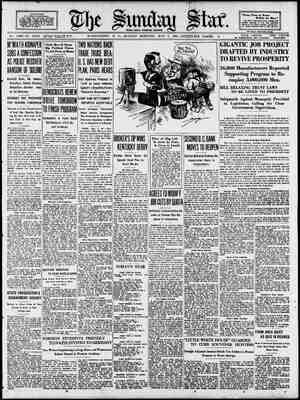Evening Star Newspaper, May 7, 1933, Page 74
You have reached the hourly page view limit. Unlock higher limit to our entire archive!
Subscribers enjoy higher page view limit, downloads, and exclusive features.
'SHOW VALUE By Maryse Rutledge One of The Star Magazine’s First- Run Stories, by the Author of Such Fiction as ‘““The Blind Who See,”” “Wild Grapes,”” and ““The Children of Fate.” | N their gay tangled world of shifting rela- tionships, they stood out as a fairy tale. The Kents. They were too handsome and happy to avoid attention. Muriel Kent didn’t wish to; Oliver didn't notice—at first. Of the two, Muriel Kent was the more self- conscious. She knew that there never was a woman who could have more than she. Her awareness of privilege was almost terrible, for somewhere lay hidden the fear that it might be snatched from her. Against such danger she trained habits around them like vines to thicken year by year. The pause at the door to lift her small shining head for a kiss. Dancing certain . Her eyes seeking his over the silver . and flowers ‘of dining tables. Sharing their world, their friends, his work. She often thought how fortunate it was that Oliver happened to be an architect, a profes- sion in which she could help and advise him, He had noble and impractical ideas when he came back from the Beaux Arts. For his own good she had to seem selfish-when he spoke of the enterprise of the West and the chance for young men in new cities. Quite impossible, sure that he understood, those lovely houses on WI'I'H Jane Reeves' coming to town every- thing seemed to grow more difficult. Muriel only vaguely remembered Jane as a name connected with Oliver’s Beaux Arts days. He and Jane, it now appeared, considered themselves old friends, Muriel meant to be very tactful about- it. But she was secretly set against the girl. And when she met Jane Reeves, she was not dis- armed by the clear straight gaze from brown eyes, the wholesome freshness and frankness of a young woman who treatsd Oliver with the affectionate ease of past comradeship and the assumption of renewed intimacy. “She's-s peach, isn't she, Melov?” He looked 80 very young and eager that morning. “A ‘nice girl,” she murmured over her break- fast tray. We'll give a little dinner for her,” she added in a tone that solved a not-too- important s “I told her to come in and take pot luck with us tonight,” he said, watching her. “Oh, did you?” She poured a second cup of coffee before she spoke. “I'm so sorry, but we have a dinner on tonight. We're dated up, xkn’?v,emn!chtthhm Perhaps you would keep an evening or two open. l."!;le'e'shecnmlmrdwmhcms He fidgeted at her dressing table. “I'll run by “Oh—houses of the rich!” “Qliver's right.” Jane had a positive way of speaking. “The architecture of the future is right here in our country.” “I daresey. Won't you have some tea?” Her meanner closed the subject. She would not have Oliver tampered with, < My “Are you going to tell her now or shall 1?” Jane 12 Jane’s brown eyes met hers squarely. -Oliver can tell you .if he .chooses” E iy “Dogoonvlthwhty'aumm." “It really wasn't anything.”
